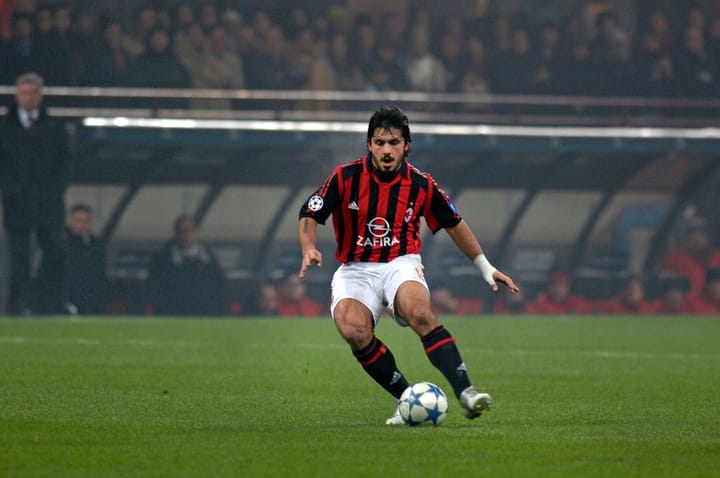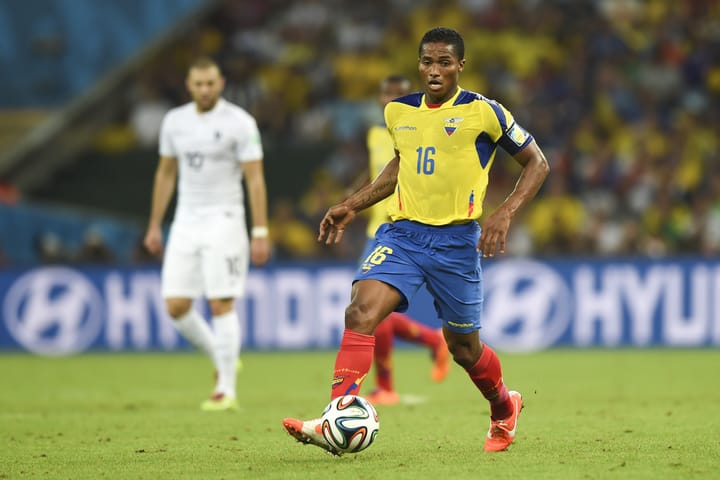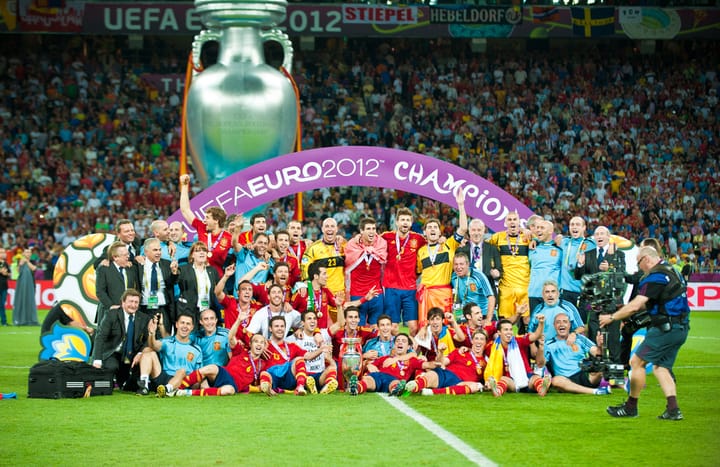Triumphant Peaks: Celebrating the Top 5 Milestones of the Swiss National Soccer Team
Although Switzerland is not a country that is most famous for their efforts on the soccer pitch, it has had some considerable success. In this article we describe the top 5 milestones of the Swiss National Soccer Team.

Switzerland has steadily woven an impressive record of success into the fabric of international soccer, establishing itself as a formidable contender. In this journey down memory lane, we recount the top five milestones that stand as proud testimony to the Swiss team’s formidable presence in the world of soccer.
1954 FIFA World Cup
In 1954, the World Cup returned after a hiatus due to the Second World War, finding a home in the picturesque landscapes of Switzerland. This tournament bore witness to an incredibly spirited performance from the Swiss National Soccer Team.
The Swiss squad was placed in Group 4, which featured Italy, England, and Belgium. From the onset, the Swiss team demonstrated a fierce determination to showcase their capabilities on their home soil. They started their campaign on a high note, securing a 2-1 victory against the Italian side in La Pontaise, Lausanne. Josef Hügi was the star for the Swiss, scoring the winner in that significant victory.
Their next encounter was with the formidable English team, a match that ended in a disappointing 2-0 loss, setting the stage for an exciting play-off match. The play-off against Italy is still remembered for the remarkable level of competitiveness and skill displayed by both teams. Amidst the roaring support from the home crowd, the Swiss managed to hold their ground, showcasing an unyielding defensive line and producing moments of brilliance on the field, winning 4-1 in the end.
The quarterfinals saw them facing the Austrian team in a game that would be recorded as one of the highest-scoring matches in World Cup history. The Pontaise stadium bore witness to a 12-goal thriller, a game characterized by an electrifying pace and a relentless onslaught of goals. The Swiss fought valiantly, with Josef Hügi once again shining and bagging a hat-trick. Sadly, despite their fierce resilience and fighting spirit, the Swiss side fell short, conceding seven goals to the potent Austrian attack.
While the journey ended in the quarterfinals, the 1954 Swiss National Soccer Team had provided their nation and the world with a performance filled with heart, skill, and a relentless fighting spirit. Players like Josef Hügi, Robert Ballaman, and Jacques Fatton became household names, their efforts symbolizing a golden era of Swiss soccer.
2006 FIFA World Cup
The 2006 FIFA World Cup held in Germany was another significant chapter in the history of the Swiss national soccer team, where they exhibited resilience and showcased their potential on the grandest stage in soccer. Let's walk through their journey in this tournament:
Switzerland was drawn into Group G alongside France, South Korea, and Togo. The Swiss team had a strong start to their campaign. They began with a staunch defensive display against France, holding the former champions to a goalless draw. It was a match where they demonstrated tactical discipline and resilience.
Building on this momentum, they faced Togo in their next match. The Swiss team seized the day, securing a 2-0 victory with goals from Alexander Frei and Tranquillo Barnetta, the stars of the match who managed to find the net and bring home a much-needed victory.
In their final group game, they faced South Korea in a decisive match to determine their fate in the tournament. The Swiss team put forth a spirited performance, winning the match 2-0 thanks to goals from Philippe Senderos and Alexander Frei. This victory ensured their top position in Group G, allowing them to progress to the knockout stages undefeated and without conceding a single goal—a testimony to their rock-solid defense and cohesive teamwork.
Entering the knockout stage brimming with confidence, Switzerland faced Ukraine. It was a battle of nerves and tactics as both teams exhibited strong defensive strategies, making it a game with few clear-cut opportunities. After regular and extra time, the deadlock couldn't be broken, and the fate of the match rested on the dreaded penalty shootout.
In a heartbreaking turn of events, the Swiss team couldn't carry their group stage momentum into the penalty shootout. They missed all of their penalties, with Ukraine converting three of their attempts, thus ending the Swiss journey in the 2006 World Cup. It was a night of despair as the Swiss team fell short, narrowly missing out on a spot in the quarterfinals.
2014 FIFA World Cup
The 2014 FIFA World Cup in Brazil saw the Swiss National Soccer Team embark on a journey marked with high hopes and expectations, with a squad rich in talent and guided by experienced tactician coach Ottmar Hitzfeld.
Switzerland was drawn into Group E, alongside France, Honduras, and Ecuador. They kicked off their campaign with a nail-biting encounter against Ecuador. It was a dramatic game that saw them rally from behind to secure a 2-1 victory, with Haris Seferović scoring the decisive goal deep into injury time, ensuring a thrilling start for the Swiss side.
In their second fixture, they faced a highly talented French team. Despite their efforts, Switzerland found themselves overwhelmed by the French, enduring a crushing 2-5 defeat in a game that exhibited the sheer offensive might of their opponents.
With their hopes hanging in the balance, the Swiss team entered their final group match against Honduras, knowing well that only a victory would keep their dreams alive. Responding to the call of the hour with vigor and determination, they produced a magnificent performance, winning 3-0, with Xherdan Shaqiri delivering a stellar performance, scoring a hat-trick, and steering his team into the Round of 16.
In the knockout stage, Switzerland was paired against Argentina, a team featuring the mercurial Lionel Messi. The Swiss team displayed remarkable grit and determination as they held a potent Argentine side at bay throughout the regular time, showcasing defensive mastery and a remarkable team spirit.
As the match progressed into extra time, the Swiss defense continued to thwart numerous Argentine attacks. However, deep into extra time, their resistance was finally broken as Angel Di Maria scored the only goal of the match, sealing a 1-0 victory for Argentina and ending the Swiss journey in the tournament.
2018 FIFA World Cup
The 2018 FIFA World Cup in Russia featured the best soccer players in the world, including a standout performance from the Swiss national team.
Switzerland was put in Group E with Costa Rica, Brazil, and Serbia. They started their campaign off against a talented Brazilian team that was full of star players. In a game that showcased their resilience and team spirit, the Swiss managed to hold Brazil to a 1-1 draw, with Steven Zuber scoring the equalizing goal.
In their next match, they squared off against Serbia in a highly charged encounter. Falling behind early in the game, Switzerland displayed remarkable determination to turn the tide in their favor. Granit Xhaka and Xherdan Shaqiri rose to the occasion, scoring incredible goals to secure a crucial 2-1 victory, setting the stage for a dramatic final group game.
Facing Costa Rica in their last group match, Switzerland knew a solid result could seal their passage into the knockout stage. In a match filled with end-to-end action, they almost managed to win, but an injury-time own goal led to a 2-2 draw, a result good enough to secure a spot in the Round of 16.
Advancing to the knockout stage, Switzerland faced a spirited Swedish side in the Round of 16. It was a tight and tactical encounter, with both teams showing strong defensive displays. Despite their best efforts to breach the Swedish defense, the Swiss side couldn’t find the back of the net. A goal from Sweden's Emil Forsberg in the 66th minute proved to be the decisive moment in a game that saw Switzerland push hard but fall short, exiting the tournament with a narrow 1-0 defeat.
2020 UEFA Euros
The 2020 UEFA Euros, postponed to 2021 due to the COVID-19 pandemic, proved to be an electrifying stage where the Swiss national soccer team truly showcased their potential.
In Group A, a difficult group of teams, Switzerland was placed alongside Italy, Turkey, and Wales. Their opening game against Wales ended in a 1-1 draw, with Breel Embolo scoring for the Swiss. Embolo’s energetic performance gave Switzerland a robust start, although they had to settle for a draw.
Facing the formidable Italian side in their next game, Switzerland found it challenging to contain the inspired Italians, eventually falling to a 3-0 defeat. However, not deterred by this setback, they showed their true mettle in their final group match against Turkey, clinching a 3-1 victory with goals from Seferović and Shaqiri. This victory was pivotal in securing their place in the knockout stage, where they progressed as one of the best third-placed teams.
In the Round of 16, Switzerland faced the reigning World Champions, France, in what turned out to be one of the most electrifying matches of the tournament. After going 1-0 up through a goal by Seferović, they later found themselves trailing 3-1 with just a few minutes to go. Showing their indomitable Swiss spirit, the team rallied remarkably to level the score at 3-3 with goals from Seferović and Gavranović, pushing the game into extra time and eventually a penalty shootout. In a nerve-wracking series of penalties, Switzerland triumphed, with goalkeeper Yann Sommer becoming the hero by saving Kylian Mbappe's penalty, ensuring a historic victory and a place in the quarterfinals.
Riding high on confidence, Switzerland faced Spain in the quarterfinals. In a tightly contested match, Switzerland displayed tremendous spirit, equalizing early in the second half through a goal from Xherdan Shaqiri. Despite going down to ten men later in the game, the Swiss held on bravely, forcing the game into a penalty shootout once again. However, fortune didn't favor them this time, as they were edged out by Spain in the shootout, bringing an end to their awe-inspiring journey in the tournament.




